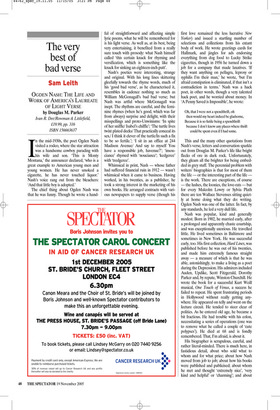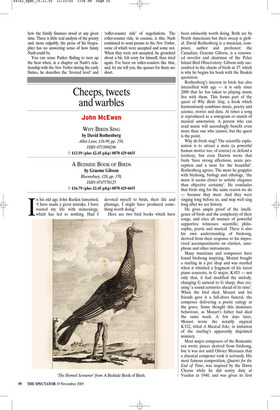The very best of bad verse
Sam Leith
OGDEN NASH: THE LIFE AND WORK OF AMERICA’S LAUREATE OF LIGHT VERSE by Douglas M. Parker Ivan R. Dee/Rowman & Littlefield, £19.99, pp. 316 ISBN 156663637 In the mid-1930s, the poet Ogden Nash visited a rodeo, where the star attraction was a handsome cowboy parading with his wife and son. ‘This is Monty Montana,’ the announcer declared, ‘who is a great example to American young men and young women. He has never smoked a cigarette, he has never touched liquor.’ Nash’s voice rang out from the bleachers: ‘And that little boy is adopted.’ The chief thing about Ogden Nash was that he was funny. Though he wrote a hand ful of straightforward and affecting simple lyric poems, what he will be remembered for is his light verse. As well as, at its best, being very entertaining, it benefited from a really sure touch with prosody: what Nash himself called ‘this certain knack for rhyming and versification, which is something like the knack for sinking an eighteen-inch putt’.
Nash’s poetics were interesting, strange and original. With his long lines skittering gleefully towards the rhyme words, much of his ‘good bad verse’, as he characterised it, resembles in cadence nothing so much as William McGonagall’s bad bad verse; but Nash was artful where McGonagall was inept. The rhythms are careful, and the feminine rhymes (when he’s good, which was far from always) surprise and delight, with their misspellings and proto-Unwinisms: ‘In spite of her sniffle/ Isabel’s chiffle’; ‘The turtle lives twixt plated decks/ That practically conceal its sex./ I think it clever of the turtle/In such a fix to be so fertile.’; ‘I sit in an office at 244 Madison Avenue/ And say to myself You have a responsible job, havenue?’; ‘insouciance’ rhymed with ‘nouciance’; ‘kedgeree’ with ‘tredgeree’.
Whimsical in print, Nash — whose father had suffered financial ruin in 1912 — wasn’t whimsical when it came to business. Having worked, in his twenties, as a publisher, he took a strong interest in the marketing of his own books. He arranged contracts with various newspapers to supply verse (though his first love remained the less lucrative New Yorker) and issued a startling number of selections and collections from his extant body of work. He wrote greetings cards for Hallmark, and jingles for ads endorsing everything from dog food to Lucky Strike cigarettes, though in 1956 he turned down a job for a company that made laxatives. ‘If they want anything on pellagra, leprosy or syphilis I’m their man,’ he wrote, ‘but I’m afraid constipation is eliminated, if that isn’t a contradiction in terms.’ Nash was a hack poet, in other words, though a very talented hack poet, and he worried about money. In ‘A Penny Saved is Impossible’, he wrote:
Oh, that I were not a spendthrift, oh then would my heart indeed be gladsome, Because it is so futile being a spendthrift because I don’t know any places where thrift could be spent even if I had some.
This and the many other quotations from Nash’s verse, letters and conversation sparkle out from Douglas M. Parker’s life like bright flecks of ore in dark rock. Unfortunately, they gleam all the brighter for being embedded in grey stuff. The perennial problem with writers’ biographies is that for most of them the life — or the interesting part of the life is the work. There are exceptions, of course — the lushes, the loonies, the love-rats — but for every Malcolm Lowry or Sylvia Plath there are ten Wallace Stevenses sitting quietly at home doing what they do: writing. Ogden Nash was one of the latter. In fact, by any standards, he led a very dull life.
Nash was popular, kind and generally modest. Born in 1902, he married early, after a prolonged and apparently chaste courtship, and was exceptionally uxorious. He travelled little. He lived sometimes in Baltimore and sometimes in New York. He was successful early, too. His first collection, Hard Lines, was published before he was out of his twenties, and made him extremely famous straight away — a measure of which is that he was able, astonishingly, to make a living as a poet during the Depression. His admirers included Auden, Updike, Scott Fitzgerald, Dorothy Parker and, by repute, Winston Churchill. He wrote the book for a successful Kurt Weill musical, One Touch of Venus, a success he failed to repeat. He spent frustrating periods in Hollywood without really getting anywhere. He appeared on telly and went on the lecture circuit. He tended to steer clear of politics. As he entered old age, he became a bit fractious. He had trouble with his colon, necessitating a series of operations (one was to remove what he called a couple of ‘cute polypses’). He died at 68 and is fondly remembered. That, I’m afraid, is about it.
His biographer is scrupulous, careful, and rather literal-minded. There is much here, in fastidious detail, about who sold what to whom and for what price; about how Nash moved from job to job; about how his books were published and publicised; about whom he met and thought ‘extremely nice’, ‘very kind and helpful’ or ‘charming’; and about how the family finances stood at any given time. There is little real analysis of the poetry and, more culpably, the prose of his biographer has no answering sense of how funny Nash could be.
You can sense Parker flailing to turn up the heat when, in a chapter on Nash’s relationship with the New Yorker during the early Sixties, he describes the ‘fevered level’ and ‘roller-coaster ride’ of negotiations. The roller-coaster ride, in essence, is this: Nash continued to send poems to the New Yorker, some of which were accepted and some not. When they were not accepted, he grouched about a bit, felt sorry for himself, then tried again. I’ve been on roller-coasters like that, and, let me tell you, the queues for them are short.


























































 Previous page
Previous page